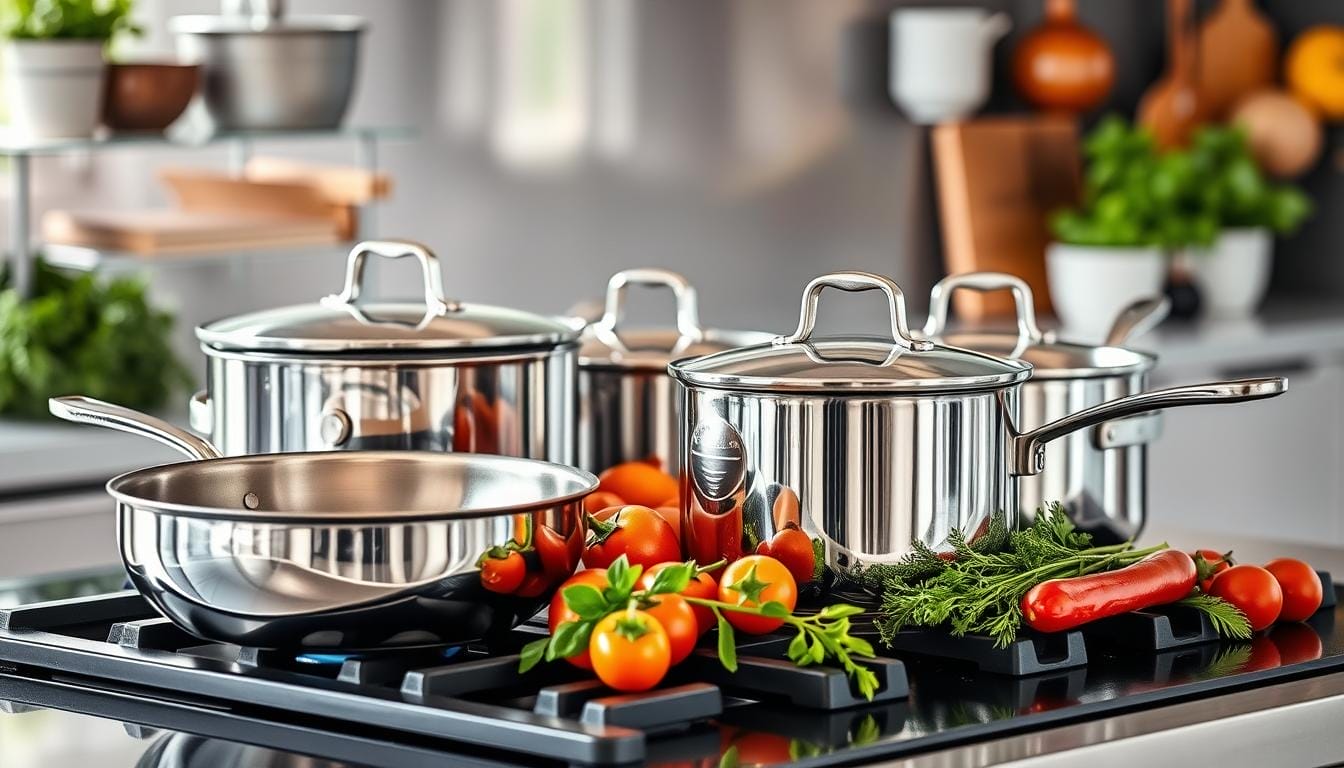Have you ever wondered why some chefs prefer stainless steel non stick cookware? Others stick to traditional nonstick options. The choice can be confusing, especially when you want to cook well and get great results.
This article explores stainless steel non stick cookware. It highlights its key features and recommends the best sets for all cooks. After testing 19 stainless steel cookware sets, only a few are worth your money. Let’s see why stainless steel non stick cookware is a top choice for lasting quality and cooking excellence.
What is Stainless Steel Non Stick Cookware?
Stainless steel non stick cookware is a mix of durable stainless steel and a special non-stick coating. This combo offers the toughness of stainless steel pots and pans with the ease of food release. Unlike old non-stick pans, this type stays strong even at high heat without releasing harmful stuff.
This cookware cooks food well, needing less oil or butter. It’s great for healthy meals. It’s also easy to clean and lasts a long time, unlike other non-stick pans.
With the right care, stainless steel non stick cookware can last for decades. It’s perfect for many cooking methods, from oven roasting to grilling.
| Feature | Stainless Steel Non Stick Cookware | Traditional Non Stick Cookware |
|---|---|---|
| Durability | Long-lasting, can last decades | Tends to break down after a few years |
| Cooking Surface | Requires some oil/butter for best results | Less oil needed |
| Heat Tolerance | Excellent for high heat cooking | May degrade at high temperatures |
| Maintenance | Requires preheating for optimal performance | More forgiving, often easier to clean |
| Health Considerations | Generally safe for high-heat cooking | Concerns over potentially toxic chemicals at very high temperatures |
Advantages of Stainless Steel Non Stick Cookware
Stainless steel non stick cookware is durable and healthy. It’s made with strong materials that last long. This makes it a great choice for any kitchen.
Durability and Longevity
Stainless steel cookware is very durable and lasts a long time. It has layers like aluminum for heat and stainless steel for the surface. This means it can handle high heat without breaking down.
Unlike nonstick pans that need to be replaced often, stainless steel can last decades. Even when the nonstick surface wears off, the stainless steel body stays strong. It’s ready for many cooking tasks.
Healthier Cooking Options
Stainless steel cookware is also safe for cooking. It doesn’t react with food like some pans do. This makes it great for cooking without worrying about harmful chemicals.
Seasoning stainless steel with oil can make it nonstick. This is perfect for cooking proteins like chicken. Stainless steel cookware also helps keep food flavors rich and enhances cooking versatility.
https://www.youtube.com/watch?v=DdpXbrPj0GQ
Understanding Cladded Stainless Steel Cookware
Cladded stainless steel cookware is known for its unique design. It has layers of stainless steel and metals like aluminum or copper. This design makes heat spread evenly, leading to better cooking results.
Heat Distribution and Cooking Performance
This cookware type avoids hotspots found in single-material pots. It’s great for cooking meats evenly or keeping fish tender. Chefs and home cooks love it for its ability to control temperature precisely.
Comparison with Traditional Stainless Steel
Cladded stainless steel cookware beats traditional stainless steel in many ways. Traditional pots can cook unevenly. But cladded cookware spreads heat well, improving cooking quality. This makes it easier to get perfect browning and searing.
Essential Features to Look for in Non Stick Cookware
When picking durable non stick cookware, look for key features. High-quality non-stick coatings are crucial for cooking and food release. Choose pans with at least five layers for better durability and longer life.
Heat distribution is also important. Stainless steel non stick cookware distributes heat evenly. This prevents hot spots and ensures even cooking, making it great for many cooking methods.
If you have an induction cooktop, make sure your cookware is compatible. Stainless steel non stick cookware works well with induction systems. This makes cooking more convenient and efficient.
Craftsmanship is also key. Well-made pots and pans last longer and handle daily use better.
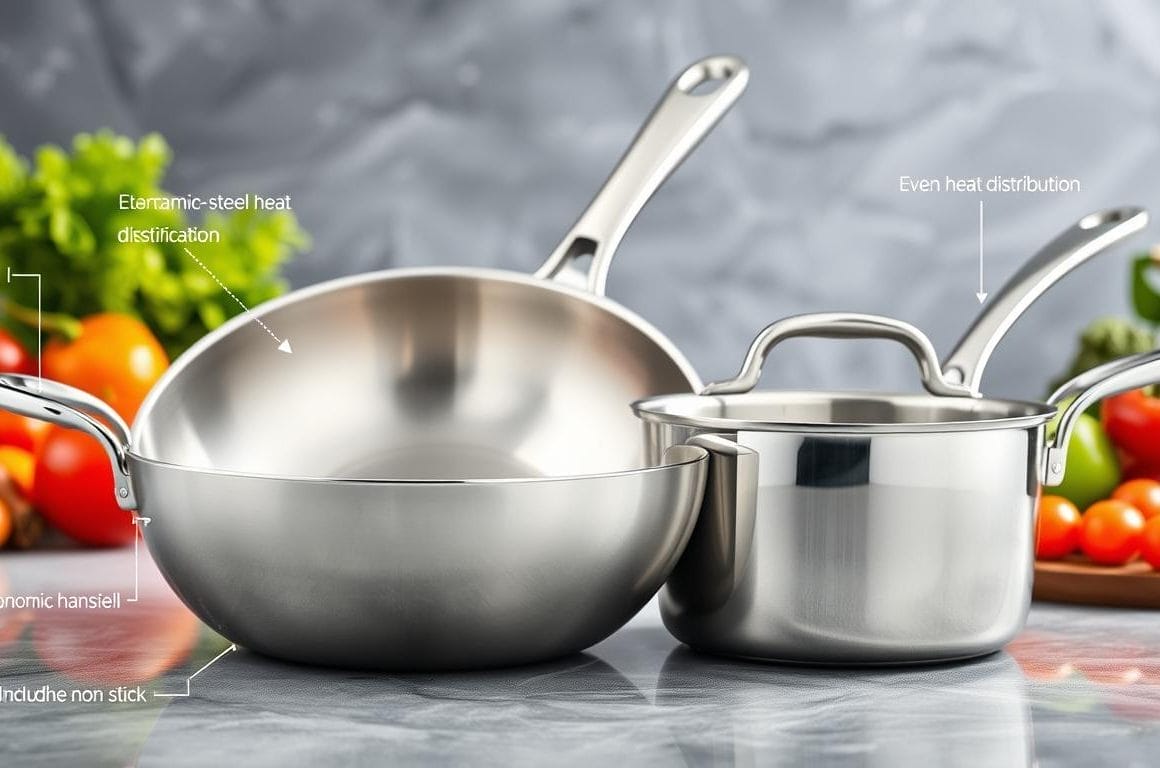
| Feature | Importance | Recommended Type |
|---|---|---|
| Non-Stick Coating | Prevents food from sticking, easy cleanup | 5-layer PTFE or ceramic |
| Heat Distribution | Ensures consistent cooking | Stainless Steel |
| Induction Compatibility | Works on induction cooktops without extra plates | Stainless Steel |
| Quality Craftsmanship | Enhances durability and longevity | High-end brands like All-Clad or Hestan |
By focusing on these features, you can choose the best durable non stick cookware for your needs.
Top Picks for Stainless Steel Non Stick Cookware
Choosing the right cookware can make cooking better. Stainless steel options are great for this. They improve cooking and make meals healthier. Here are some top picks for different tastes and budgets. They are durable, easy to clean, and distribute heat evenly for consistent cooking results. If you’re specifically looking to prepare perfect rice every time, investing in one of the best stainless steel rice cookers can be a game changer. These cookers not only offer excellent performance but also ensure your food is free from harmful chemicals often found in non-stick alternatives.
Best Overall: All-Clad D3 Cookware Set
The All-Clad D3 Everyday cookware set is the top choice. It’s known for its great performance and lasting quality. It can handle up to 600°F and comes with skillets, saucepans, a sauté pan, and a stockpot.
Best Value: Calphalon Stainless Steel Cookware Set
The Calphalon set is a great value. It’s priced at $58 for a 10-inch frying pan, now down to $55. It’s perfect for everyday cooking and is a smart buy for your kitchen.
Best Professional-Grade: Hestan ProBond Collection
The Hestan ProBond collection is the best for serious cooks. It’s priced at $250, now $200. It offers top-notch quality and features that chefs love. It’s not just for cooking, but also for making your kitchen look great.
The Best Non Stick Cookware Set Features
Choosing the best non stick cookware set means looking for certain features. Ergonomic handles make cooking easier and more comfortable. Tempered glass lids let you see inside while keeping moisture in, improving your cooking.
Even heat distribution is key for cooking evenly. This feature helps avoid hotspots, making your dishes better. Sets that are dishwasher-safe make cleaning up a breeze. They can also handle high temperatures, from 500°F to 550°F, for versatile cooking.
Testing has shown which non stick cookware sets are the best. A total of 13 sets were tested, leading to some top picks:
| Cookware Set | Best For | Price Range | Key Features |
|---|---|---|---|
| Le Creuset Toughened Nonstick PRO 13-Piece Set | Overall Best | $600 – $955 | Durability, range of pieces |
| Blue Diamond Diamond-Infused Ceramic Nonstick 11-Piece Set | Budget Option | Under $200 | Fast heating, affordable |
| HexClad Hybrid Perfect Pots & Pans Set | Most Durable | $500 – $800 | Multiple piece count, hybrid design |
| Our Place Cookware Set | Best Ceramic | $145 – $195 | Color options, stylish design |
| Made In Nonstick Cookware Set | Perfect Score Across Testing | $200 – $350 | 5-ply design, copper core |
Knowing what makes high quality stainless steel cookware special helps you pick the right set. This way, you can find a set that fits your cooking style and needs.
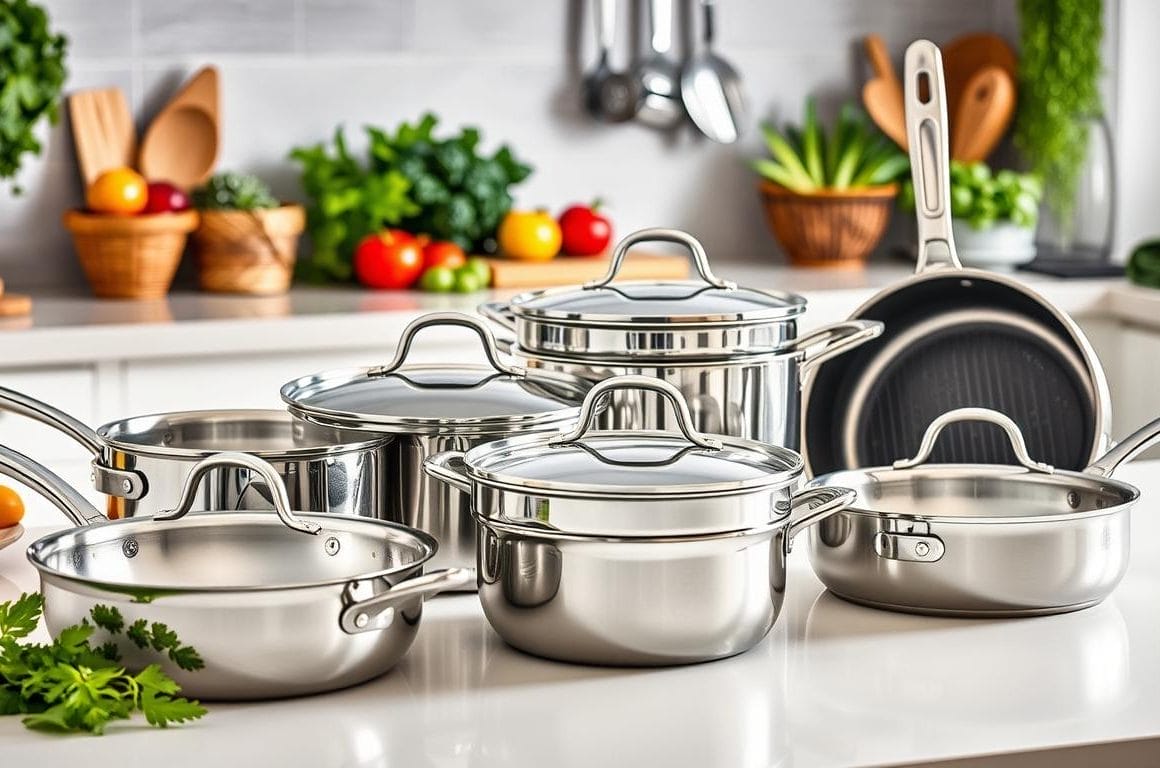
Choosing Durable Non Stick Cookware for Your Kitchen
Choosing durable non stick cookware can make cooking better and last longer. It’s key to look at the materials, how to care for it, and if it works with different stoves, like induction. Knowing the good and bad of non stick and stainless steel helps you choose wisely.
Considerations for Maintenance and Care
Stainless steel cookware and its non stick friends need careful handling. To keep them in top shape, follow these tips:
- Avoid using metal utensils that may scratch the surface.
- Do not expose non stick pans to high heat, typically above 400°F, as this can compromise the coating.
- Regularly clean cookware with non-abrasive sponges and mild dish soap for efficient upkeep.
- Store cookware in a way that prevents scratches, such as using dividers or cloths between pieces.
Induction Compatibility
When picking non stick cookware, check if it works with induction stoves. Stainless steel is great for induction because it’s magnetic. Make sure the non stick you choose is made for induction to cook well.
| Feature | Stainless Steel Cookware | Non Stick Cookware |
|---|---|---|
| Durability | High; resistant to scratching and corrosion | Moderate; may wear down over time |
| Heat Tolerance | Excellent; suitable for high temperatures | Limited; not recommended above 400°F |
| Maintenance | Regular cleaning required; avoid abrasive tools | Easy to clean; food easily releases from surface |
| Weight | Heavier; provides stability during cooking | Lighter; easier to handle for some users |
| Induction Compatibility | Generally excellent; magnetic properties | Check specifications; not all are compatible |
Choosing the right non stick cookware means knowing these points. It helps you decide between non stick and stainless steel for the best kitchen experience.
Common Misconceptions About Stainless Steel Cookware
Many people think that food always sticks to stainless steel cookware. But, when used right, stainless steel non stick cookware can release food well. The secret is preheating the pan and using the right amount of oil.
Some believe stainless steel cookware is hard to take care of. But, with simple steps, it stays in great shape for years. Many stainless steel pans are made to last, often longer than non-stick ones. Just clean them regularly and season with oil to keep them non-stick.
Another myth is that stainless steel cookware is too heavy. But, many modern pans have ergonomic handles and are light. This makes them easy to handle.
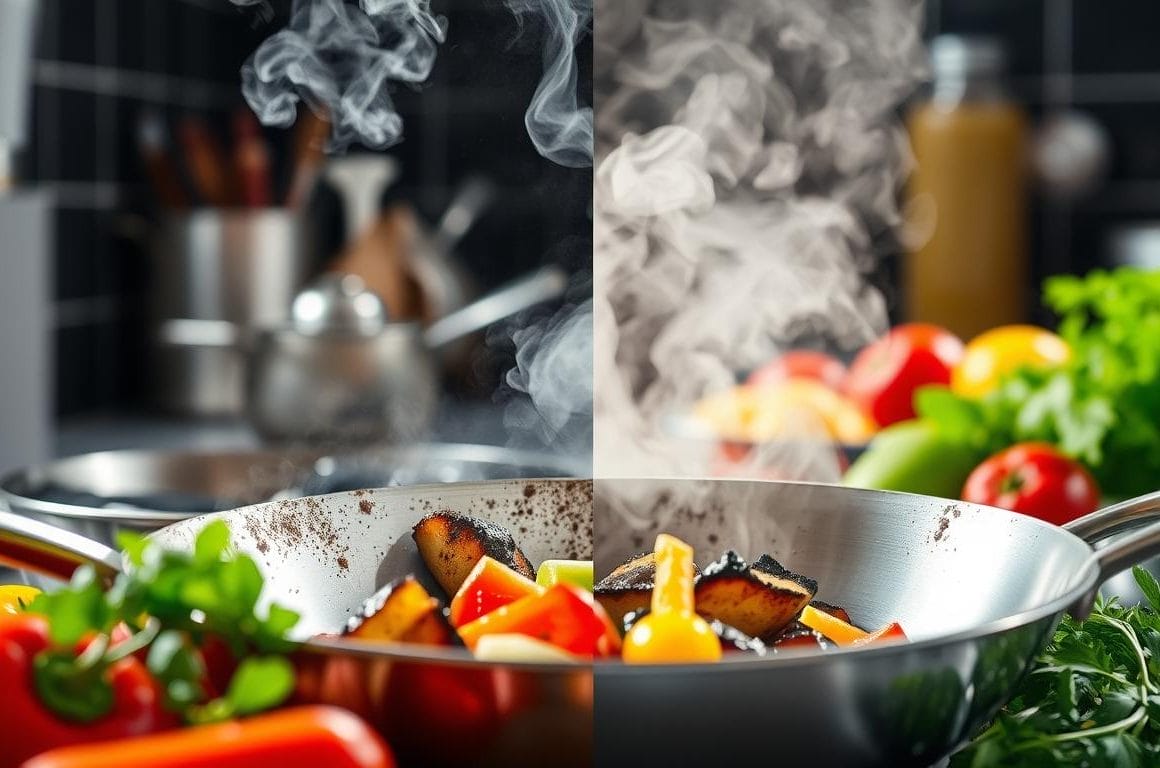
Lastly, the cost can confuse people. While some top stainless steel sets are pricey, there are many affordable ones. This means you can find quality cookware that fits your budget, proving stainless steel isn’t always expensive.
| Misconception | Truth |
|---|---|
| Food sticks to stainless steel cookware | Proper preheating and oil use prevent sticking |
| Stainless steel cookware is hard to maintain | Regular cleaning and seasoning enhance longevity |
| Stainless steel cookware is too heavy | Modern designs are ergonomic and lightweight |
| Only high-end stainless steel is effective | Many affordable options are highly durable |
The Benefits of Using High Quality Stainless Steel Cookware
High quality stainless steel cookware offers many advantages. It keeps heat well and cooks food evenly. This is why chefs and home cooks love it.
It’s also very durable. Made from 18/10 stainless steel, it doesn’t rust or corrode. With the right care, it can last over 10 years. Nonstick pans, on the other hand, need to be replaced every 3-5 years.
Stainless steel cookware doesn’t react with food. This means your dishes will taste better. It’s also safe for acidic foods and works well on induction cooktops.
It’s versatile and works for many cooking methods. A 3-ply design makes it even better at distributing heat. This leads to more even cooking results.
| Feature | High Quality Stainless Steel Cookware | Other Cookware Materials |
|---|---|---|
| Durability | Lasts over 10 years with proper care | Needs replacement every 3-5 years (nonstick) |
| Corrosion Resistance | Highly resistant (18/10 composition) | Varies; often contains less nickel |
| Heat Distribution | Excellent, especially with 3-ply design | Varies greatly; can be uneven |
| Reactivity | Non-reactive to foods | Can react with acidic foods (aluminum) |
| Maintenance | Easy to clean, dishwasher safe | Requires special care (seasoning or coating) |
Choosing high quality stainless steel cookware is a smart move. It makes cooking better and more enjoyable. It’s a great addition to any kitchen.
Maintenance and Care for Stainless Steel Non Stick Cookware
Keeping your stainless steel non stick cookware in good shape is key. By following the right care tips for stainless steel cookware, it will look and work better over time. Use a soft scrubber or rubber spatula to remove stuck-on food. Most of the time, just washing it with hot water is enough.
It’s important to cook with stainless steel pans at medium or lower heat. High heat can cause discoloration or stubborn stains. For tough stains, try deglazing the pan with water over medium heat for about five minutes. A baking soda paste is also great for deep cleaning.
To keep your pan shiny, use a stainless steel cleaner like Mauviel Inobrill Stainless Steel Cleaner. It removes minor scratches and polishes the surface well. Remember, a thin layer of oil before cooking helps prevent food from sticking. But, stainless steel pans are not completely non-stick.
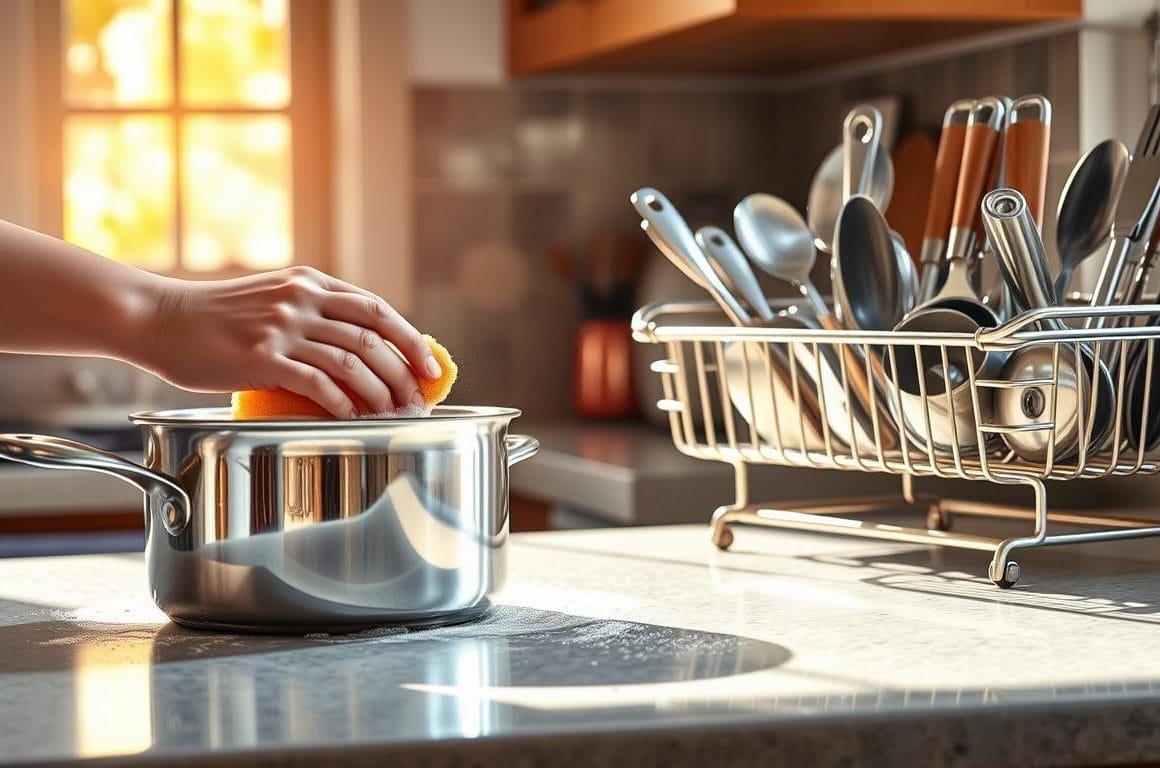
Here are some valuable care tips for maintaining stainless steel non stick cookware:
- Avoid metal utensils to prevent scratches.
- Use a suitable stainless steel cleaner for polishing.
- Apply vinegar for removing stains inside the pan.
- Employ a 1:1 vinegar to water solution for hard water spots.
By following these care tips for stainless steel cookware, your cookware will stay in great condition. For more detailed cleaning and care advice, check out this guide. Taking the time to maintain your cookware will make it last longer and perform better.
How to Avoid Sticking with Stainless Steel Cookware
Cooking with stainless steel can cause food to stick if you don’t use the right techniques. Many people prefer non-stick pans because of this problem. To avoid sticking, it’s important to know some key tips for cooking with stainless steel.
Start by preheating the pan for 2 to 3 minutes at 225°F to 235°F. This makes the surface ready for cooking, reducing sticking. The water droplet test is a good way to check if the pan is hot enough. Using this method makes cooking more efficient and enjoyable.
Also, make sure the oil or butter is hot enough before cooking. When oil ripples, it’s ready. Adding fat, like for eggs or fish, helps stainless steel cook better.
Another trick is to wait for food to form a crust before flipping it. Moving food too much can stop the crust from forming. This crust helps prevent sticking. Don’t overcrowd the pan to let steam form and heat spread evenly.
It’s also important to take care of your cookware. Avoid using harsh chemicals, as they can damage the surface and make food stick. Let the pan cool before washing and use paper towels for cleaning. For a natural non-stick coating, try heating coconut oil and salt. These tips help you enjoy stainless steel without sticking issues.
Comparing Stainless Steel Cookware with Other Materials
Stainless steel cookware is known for its unique qualities and flexibility. It’s important to know how it compares to copper and aluminum in terms of durability. Each material has its own strengths and weaknesses, affecting how well it cooks food.
Copper and Aluminum vs. Stainless Steel
Copper and aluminum cookware have their own benefits compared to stainless steel. Copper heats up fast, which is great for quick cooking. But, it can react with acidic foods, making stainless steel better for those who want non-reactive cookware.
- Stainless Steel: Needs at least 16% chromium to resist corrosion and is non-reactive. It’s often labeled as “18/10” for its best durability.
- Copper: It conducts heat well but needs a tin or stainless steel lining to avoid reacting with food.
- Aluminum: It’s light and cheap but can warp under high heat unless it’s strengthened with stainless steel.
Non Reactiveness and Cooking Versatility
Stainless steel is great for many cooking methods because it doesn’t react with food. The 300 series, especially 316, is very durable and resistant to corrosion. This makes it last longer, even with daily use. Copper, though good at transferring heat, can be a problem without a lining. Taking care of stainless steel, like washing it gently, helps it stay in good shape.

In conclusion, stainless steel is a top choice when comparing cookware materials. It’s durable, non-reactive, and versatile compared to copper and aluminum. Knowing these differences helps make better choices that improve cooking and food safety.
Where to Buy Top Rated Stainless Steel Cookware
Finding the right place to buy stainless steel non stick cookware can make a big difference in your cooking. Many trusted retailers have high-quality products. These products are durable and versatile for any home chef.
Several top-rated stainless steel cookware retailers offer a wide range of options. When looking to buy, consider factors like price, selection, and customer service. Here’s a quick guide on where to find popular cookware sets:
| Retailer | Product | Price |
|---|---|---|
| Wayfair | All-Clad D3 Cookware Set | $700 |
| Sur La Table | All-Clad D3 Cookware Set | $700 |
| All-clad.com | All-Clad D3 Cookware Set | $650 |
| Amazon | Calphalon Stainless Steel Cookware Set | $160 |
| Wayfair | Calphalon Stainless Steel Cookware Set | $160 |
| Walmart | Calphalon Stainless Steel Cookware Set | $21 |
| Williams Sonoma | Hestan ProBond Collection | $900 |
| Home Depot | Tramontina Stainless Steel Cookware Set | $279 (reduced) |
| Amazon | Le Creuset Stainless Steel Cookware Set | $850 |
Exploring these options helps find good deals on quality cookware. Online sites like Amazon and Wayfair have a wide selection. This makes it easy to buy stainless steel non stick cookware that fits your needs. Local stores like Walmart offer affordable options, ensuring there’s something for every budget.
Conclusion
When looking at stainless steel non stick cookware, it’s key to see what each type brings to the table. Non-stick pans have become a must-have for frying eggs and making pancakes. But for achieving a perfect sear on meat or making gravies, stainless steel pans are unbeatable.
Both non-stick and stainless steel pans are crucial for different cooking styles. Non-stick pans are great for easy cleanup, while stainless steel pans can handle high heat and last longer. The best cooks use both to improve their cooking skills.
Choosing the right cookware depends on your cooking style and preferences. Investing in quality stainless steel non stick cookware can make cooking better. For more on the differences and similarities, check out this resource.
FAQ
What are the benefits of using stainless steel non stick cookware?
How do I maintain my stainless steel non stick cookware?
Is stainless steel cookware difficult to clean?
Can stainless steel non stick cookware be used on induction cooktops?
What should I look for when buying a stainless steel non stick cookware set?
Are there any safety concerns with non stick coatings?
How does stainless steel cookware compare with other materials like copper and aluminum?
What are some top rated brands of stainless steel non stick cookware?
Can stainless steel non stick cookware handle high heat?
Source Links
- https://www.seriouseats.com/best-stainless-steel-cookware-sets-7483329
- https://www.forbes.com/sites/forbes-personal-shopper/article/best-stainless-steel-cookware-sets/
- https://www.greenpan.us/products/stanley-tucci-stainless-steel-ceramic-nonstick-11-piece-cookware-set
- https://madeincookware.com/blogs/the-showdown-stainless-versus-non-stick
- https://nourishevolution.com/when-to-use-nonstick-pans-and-when-not-to/
- https://www.thespruceeats.com/nonstick-vs-stainless-steel-cookware-908922
- https://www.360cookware.com/blogs/360-cookware-blog/stainless-steel-vs-nonstick-cookware?srsltid=AfmBOopTY2Ukc2Hy2qCuMhEPyvRtxJAPF7FtCQrusRmLK3nf4h2_iffG
- https://www.marthastewart.com/1541812/how-choose-between-stainless-steel-nonstick-cast-iron-cookware
- https://madeincookware.com/blogs/the-ply-guide
- https://www.seriouseats.com/best-all-clad-cookware-7495993
- https://cookprimalgourmet.com/blog/consider-buying-cookware/
- https://guide.michelin.com/us/en/article/features/non-stick-cookware-pots-pans-guide
- https://www.eagleconsumer.in/6-things-to-look-for-in-a-good-non-stick-cookware/
- https://www.epicurious.com/expert-advice/the-best-frying-pans-stainless-steel-article
- https://www.foodandwine.com/lifestyle/kitchen/best-non-toxic-cookware
- https://www.bonappetit.com/story/best-nonstick-pans?srsltid=AfmBOori-ZHiZCFRb9IPWkq88Z72LEF3rKdNfnforEsWu0kNtNFej5Wj
- https://www.businessinsider.com/guides/kitchen/best-nonstick-cookware-sets
- https://www.foodandwine.com/lifestyle/kitchen/best-nonstick-cookware-sets
- https://www.thespruceeats.com/best-nonstick-cookware-sets-4140140
- https://learn.surlatable.com/stainless-steel-nonstick-pros-cons/
- https://nest-wellness.com/blog/healthy-cookware-and-food-storage/
- https://www.consumerreports.org/home-garden/cookware/buying-guide/
- https://thecookwareadvisor.com/buying-stainless-steel-cookware-read-this-first/
- https://aviasworld.com/blogs/general/busting-the-myths-about-stainless-steel-cookware?srsltid=AfmBOoocqOO_uy9XL1sLwRwNI3929PRvdahi3hO3He0EaeGQZbQsmamA
- https://medium.com/linda-chan/non-stick-vs-stainless-steel-pans-which-is-right-for-you-33741d74f967
- https://www.leafscore.com/eco-friendly-kitchen-products/stainless-steel-cookware-pros-cons/
- https://www.lifeisbutadish.com/why-stainless-steel-cookware-is-the-best/
- https://www.360cookware.com/blogs/360-cookware-blog/26544707-how-to-care-for-your-stainless-steel-cookware?srsltid=AfmBOoqNdqeSGZ-0EQHDRhqLJaVx_XTlulKGOyUKN2p5ZwpAprsDmHf7
- https://www.boroughkitchen.com/blogs/news/how-to-clean-a-stainless-steel-pan-inside-and-out
- https://www.all-clad.com/care-use?srsltid=AfmBOoqsEqh53V2NldBKBfBEDqyzXdcyZp_q-5CaTp1bINbrnMpqPi4x
- https://www.cristelusa.com/blogs/infos/how-to-stop-food-from-sticking-to-stainless-steel-pan
- https://legendcookware.com/blogs/article/stainless-steel-pans-sticking?srsltid=AfmBOorAKAq2KJ836eQgNIqZYoWgZTTO9EEFvGnM7vDFbElPhzFV8duK
- https://www.foodandwine.com/guide-to-stainless-steel-cookware-8558171
- https://www.kitchenkapers.com/pages/cookware-materials-and-why-they-matter
- https://www.foodandwine.com/lifestyle/kitchen/best-stainless-steel-cookware-sets
- https://www.thespruceeats.com/best-stainless-steel-cookware-sets-4149468
- https://proware-kitchen.co.uk/non-stick-vs-stainless-steel/
- https://metercube.com/blog/how-to-decide-between-non-stick-vs-stainless-steel-frying-pan/?srsltid=AfmBOopkddvV3BlmKw1T7zfSeDSGF9jAxIG4jBwM8X6f2BFq0rNC8qj7
- https://rudrakitchenworld.com/stainless-steel-frypans-vs-non-stick-frypans-which-is-right-for-you/
